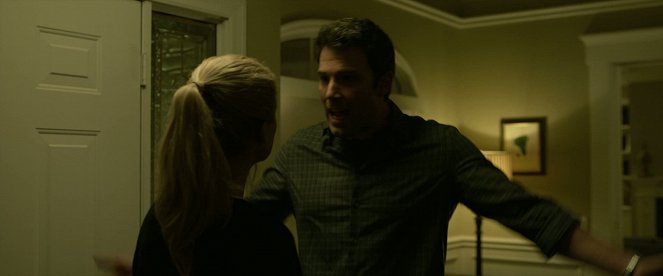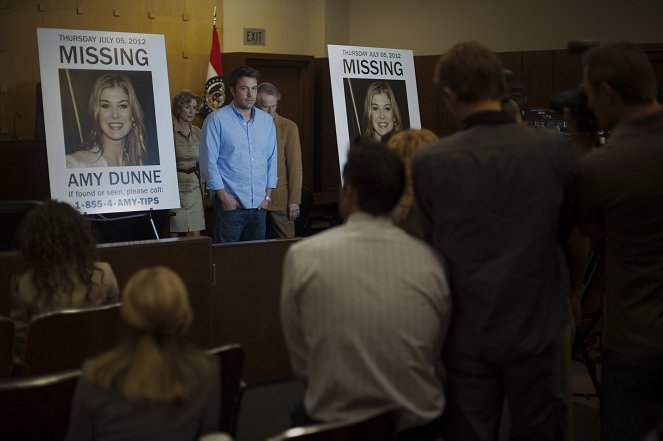Regie:
David FincherDrehbuch:
Gillian FlynnKamera:
Jeff CronenwethBesetzung:
Ben Affleck, Rosamund Pike, Neil Patrick Harris, Tyler Perry, Carrie Coon, Kim Dickens, Patrick Fugit, David Clennon, Lisa Banes, Missi Pyle (mehr)Inhalte(1)
Nick Dunne muss am fünften Hochzeitstag seine Ehefrau Amy als vermisst melden. Alles im Haus deutet darauf hin, dass sie von Einbrechern gewaltsam entführt worden ist. Während die Polizei ihre Ermittlungen beginnt, starten die Medien eine groß angelegte Kampagne. Die ganze Stadt macht sich auf die Suche nach der abgängigen Amy. Als sich die Beweise verdichten, dass es in der Ehe der Dunnes Probleme gegeben haben soll, schlägt die Stimmung um. Nick steht plötzlich unter Mordverdacht. (ORF)
(mehr)Videos (2)
Kritiken (17)
Am Anfang ist der Film unglaublich fesselnd und verdammt stimmungsvoll. Ungefähr in der Hälfte artet er aber in eine Reihe von unglaubwürdigen und an den Haaren herbeigezogenen Situationen aus, bei denen man sich fragt: "Wie ist es möglich, dass…?“, "Ist das euer Ernst?“, "Ist das FBI wirklich so dumm?“ u. Ä. Es ist schade, weil sich der Film offensichtlich darum bemüht, so realistisch wie möglich zu sein. Diese unsinnigen Dinge erlauben ihm das jedoch nicht.
()
Wer möchte nicht den nicht Schädel seiner Frau aufmachen und man hineinschauen, was den da so drin ist? Der Bester Fincher seit 2007. Insbesondere die erste Hälfte ist brilliant. Die Art und Weise, wie es Fincher gelungen ist, zwei unzuverlässige Bucherzähler elegant in eine aufregende Filmrede zu integrieren, verdient (un)akademische Bewunderung. Insbesondere deshalb, weil der Film weder über die Vielschichtigkeit noch die Dringlichkeit des Buches verfügt, es jedoch vermag, diese mit drängender Ironie und vernichtender Überspitztheit auszugleichen. Die Kritik an einer verkrüppelten Gesellschaft, die sich lediglich an Reflexionen oder Medienbildern orientiert, wird hier mit Leichtigkeit und vollends krampflos durchgeführt. Mit der anderen Hälfte habe ich mehr Probleme, denn diese neigt sich gar einem leichten campähnlichen Ton zu, und mach sich die Arbeit besonders im Bezug zur unwiderstehlich psychopathischen Karikatur der Hauptfigur ein wenig leichter, als hier von subtiler Gesellschaftskritik und aufmerksamer Satire über eine Ehekrise bis hin zu schockierenden Wendungen ausgewichen wird. Außerdem scheint es in einigen "dunklen" Szenen, als ob Ben Affleck (welchem die Möglichkeit genommen wurde, sich mit einem rindsviehhohlen Lächeln zu verteidigen) an die Grenzen seines schauspielerischen Könnens stößt. Ich kann nicht gerade sagen, Fincher hätte mich grenzenlos vom Sinn sämtlicher Aspekte seines Spiels überzeugt, jedoch ich gebe ungefoltert zu, dass selbst unter Berücksichtigung dessen, wie anspruchsvoll die Vorlage sowie sämtliche materienrelevanten Fallstricke waren, sich die anfänglich etwas gleichgültige Haltung in tiefe Anerkennung verwandelt. Ich werde mir diesen Gone Bitch Streifen gerne noch einmal reinziehen.
()
Ein perfektionistisch kompaktes Mosaik der Ereignisse. Akribisch selbstbewusst, mit einem genauen Timing in jeder Szene und in jeder Aufnahme. Und genau deswegen und weil ich Finchers Talent bewundere, tut es mir leid, dass der Film gleichzeitig so kalt und entpersönlicht ist. Dass er den Zuschauer*innen nicht ermöglicht, an ihm teilzunehmen, und ihnen nur die Rolle der Beobachter überlässt. Es ist ein Teil vom Spiel des Meisters, es ist aber schade. Der elektronische Trent Reznor und Atticus Ross gaben einst eine Musikidentität der Welt der Helden, die aus Einsen und Nullen ein Internet-Phänomen aufgebaut haben. Originell und wirkungsvoll. Was hat aber ihr chemischer Obstauflauf in der Geschichte über die Beziehung von zwei Menschen zu suchen? Wäre nicht Gone Girl - Das perfekte Opfer ein noch besserer Film, wenn er durch Leidenschaft und Emotionen getrieben wäre? Es ist ein Film über den Zerfall einer Ehebeziehung und er hat den gleichen audiovisuellen Charakter wie Soderberghs Thriller über den tödlichen Virus.
()
Bitching about Fincher playing it safe is like badmouthing Jagr for his hockey finesse and scoring goals. This narrative, directed with the precision of a neurosurgeon, for whom the camera is the scalpel and the music the anesthetic, precisely doses the marital crisis with a cool detachment, in which the apparent waters of detachment are navigated by actors who have every letter of the script pinned directly to their bodies. Affleck's worldliness with the hallmark of a small-town dweeb works, but Rosamund Pike reigns supreme. Their interaction is something you experience on screen once or twice every three years. It’s a perfectly polished film that knows it and isn't ashamed of it. The first and last shots are divine.
()
Spoilers ahead. A five-act play about marriage and engaging storytelling. The film not only preserves the book’s “he said/she said” structure, but further thematises the telling of various versions of the same story through words and images. From the storytelling perspective, Gone Girl is notable in both how the film communicates with the viewer and how the individual narrative segments communicate with each other. One gets the impression that the information in Amy’s diary is a response to what Nick is experiencing and vice versa. The diary flashbacks trigger events in the present (the discovery of Amazing Amy’s artifacts) and the returns to the present are handled with fluid graphic transitions (the kiss – wiping of the mouth), thanks to which the shots organically complement each other. As the co-creator of Nick’s story, Amy is thus seemingly present even in scenes in which she does not physically appear (in the book, this impression is achieved through Nick’s feeling that Amy is looking over his shoulder and commenting on the text of the novel that he is writing). Thanks to the “cooperation” between the information from the past and that from the present, both storylines can serve to convey evidence supporting the intensification of the police investigation (which Flynn does not needlessly delay here, making better use of it than in the book to tighten up the narrative). Similar communication takes place at a higher level between the first and second parts of the film. In the second part, there are variations on scenes from the first part, with a different allocation of the roles of prey and predator (first Nick and then Amy suspects that someone is moving around in front of the house) and different motivations for their actions (the goal of “finding Amy” remains, but until the final act, it is not her life that is in danger, but Nick’s). ___ Like the composition of some of the shots, which are terrifying in how inhumanly perfectly centred they are, the similarity of whole scenes is confirmation of Fincher’s obsession with symmetry. Even so, I don’t consider the moral relativism of either the book or the film to be as well-honed as their creators would have liked. Against a sadomasochistic sociopath and murderer stands a rather ordinary guy who “only” lies, treats his own father like shit and has been unfaithful to his wife. ___ I suspect that the negative depiction of the female protagonist was the reason that the book appealed to Fincher. Nevertheless, women who have been betrayed may feel a certain satisfaction from the fact that Amy exclusively uses feminine weapons to symbolically castrate her husband (for which we are prepared by Go’s “Protect Your Nuts” T-shirt in the opening scene). Her power does not consist in thinking and acting like a man. ___ Fincher’s handling of the audio-visual form of every shot is more masterful from film to film. Minor adjustments in colour, pacing and shot size are used to adapt the overall noirish atmosphere with cold colours into a clinical police procedural here, a toxically cynical relationship satire there (along the lines of Who's Afraid of Virginia Woolf?) and even a splatter flick. Instead of switching between thriller, biting social commentary and dark comedy, these individual types are layered on top of each other, so that we can view each scene from multiple (genre) perspectives and admire the precision with which Fincher takes care to ensure that none of the genres dominates and that the viewer cannot experience the satisfaction that comes with the fulfilment of a particular formula. The ending is as unsatisfying (in the sense of not being a typical Hollywood ending) as what the film says about certainty in marriage and honesty in relationships generally. 85%
()
(weniger)
(mehr)





Werbung